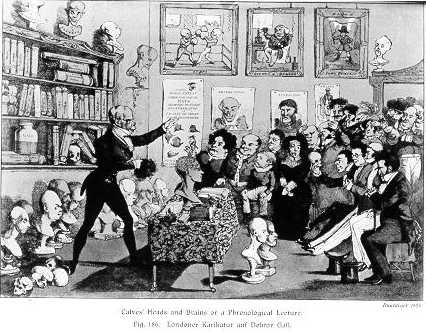
Gall, Franz Joseph. "A Lecture by Dr. Gall." Caricature by J. Rowlandson
Psychology is a relatively new discipline, but it has its roots in ancient and modern philosophy. Philosophers have long sought to answer basic questions about human nature. Religious, political and economic influences kept popular the idea that human nature is built-in and even inherited. With all our similar experiences and needs, critics observed, no two human beings are exactily alike. Many popular, nonscientific systems were developed in an effort to explain and even predict human behaviour on the basis of such built-in factors as physical appearance and physical size.
Physiognomy

Physiognomic explanations for human behaviour argued that it was possible to "read" one's character in his or her physical features. An early system of this was popularized by Johann Kaspar Lavater ( 1741 -1801) and its effects can still be read in nineteenth - and early twentieth-century literature where physical descriptions are supposed to indicate certain personality traits, eg. a "noble" brow, a "weak" chin or a "generous" mouth. Lavater's ideas were later extended by an Italian criminologist who described the shifty-eyed, sneering "criminal type".
Phrenlogy
Franz Joseph Gall(1758-1828) popularized phrenology(literally from the Greek for "study of the personality"), a technique for inferring character from the shape and form of the skull. Phrenologists assumed that certain personality traits and mental faculties were revealed in the bumps and dents they could feel through patients' scalps. Though ultimately discredited, phrenology enjoyed immense popularity and success, and offered a simple(though invalid) way to predict behaviour on the basis of a few observations.
No comments:
Post a Comment